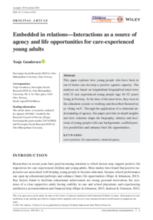Displaying 21 - 30 of 111
This study aimed to compare mental health problems and health service use among adolescents receiving in-home services (IHS), living in foster care (FC) and general population youth (GP).
The article discusses two previously published articles by the author and two co‐authors, where the topics are the history of leaving care support in Norway and how the Nordic welfare model may represent a problematic frame for leaving care support.
This article explores the possibilities of a systemic approach in the support of parents whose children are placed in public care.
This paper explores how young people who have been in out‐of‐home care develop a positive agentic capacity.
This study investigates the extent and causes of child abandonment and various practices and services in relation to prevention of child abandonment in Denmark and other high-income countries.
This study consists of interviews with 22 children’s spokespersons in Norway. Study findings question whether children in care proceedings understand the invitation to voice their wishes as confined to matters relating to the proceedings.
Informed by developmental perspectives that consider young people's development through participation across contexts in everyday life and by research into how parents in ‘ordinary’ families organize care, the authors of this article developed a study based on interviews with 15 unaccompanied refugee minors and their professional caregivers at residential care institutions.
This article studies how three groups of professional decision-makers – child welfare workers, experts on children and judges – exercise discretion in decisions on adoption from care in the Norwegian child welfare system.
The overall aim of the present study was to expand knowledge about depression among unaccompanied refugee minors in the years after they were granted protection in Norway.
The study from Chile, Lithuania and Norway explores how social workers define family and more specific the position of extended families within child welfare and thus indicate contextual differences and similarities.

